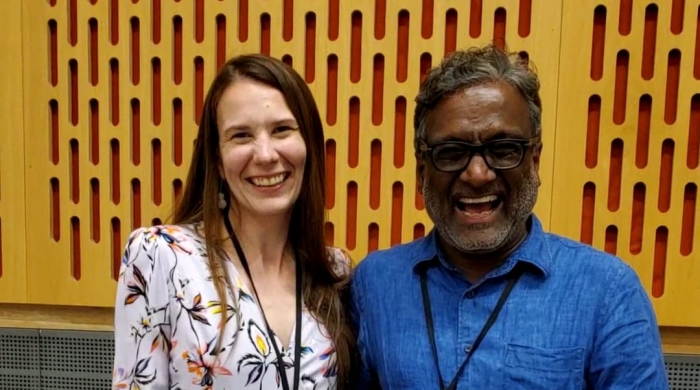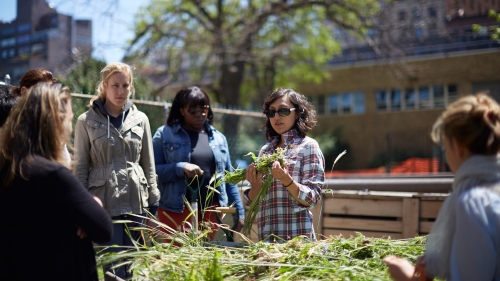Food Studies alum Scott Alves Barton discusses his work with the three-year African American Garden project at the New York Botanical Garden.
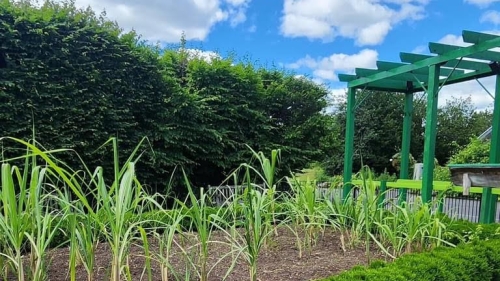
This summer, alum and former adjunct faculty at NYU Steinhardt Scott Alves Barton (PhD ‘16, Food Studies) is participating in the third and final year of the African American Garden at the New York Botanical Garden (NYBG).
Part of NYBG’s Edible Academy, the African American Garden explores and celebrates Black culture through the lens of plants. This three-year project is curated by Dr. Jessica B. Harris, America’s leading expert on African foodways and the author of High on the Hog, which was adapted into a popular Netflix series in 2021.
“In 2021, Dr. Jessica B. Harris moderated a conversation series called “The Food Dialogues” at the NYBG about botanicals and food waste and cooking within the Latin and African diaspora,” says Barton, who had a 25-year career as an executive chef and culinary educator; Ebony magazine named him one of the top 25 African American/Diaspora chefs. “The positive reception of this work led to funding and fellowships from the Andrew W. Mellon Foundation and the Ford Foundation to start the African American Garden project, with the idea to combine scholarship with an applied aspect that reaches into the community.”
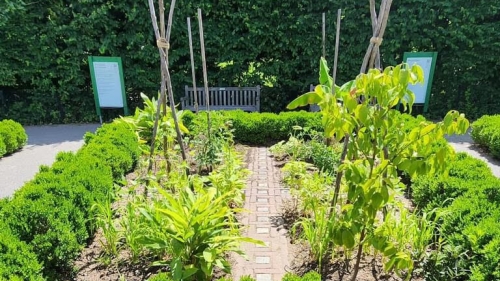
The African American Garden showcases botanical knowledge through the lens of “if you can see it, you can be it” by growing things that are reflective of the population in the Bronx. In 2022, the Garden comprised plants that impacted Black lives in the United States, such as rice, okra, cotton, and tobacco. In 2023, it highlighted fruit trees and plants of the Caribbean.
This year, the garden engages with the botanical legacies of the African Diaspora, including plants that are food staples, remedies, and sources of inspiration to Black culture in the United States, the Caribbean, and Central and South America.
“The nature of botanical gardens in the U.S. and Europe is a core foundational aspect of settler colonialism and the appropriation of materials from tropics,” says Barton, who is currently an assistant professor of Africana Studies at the University of Notre Dame. “We wanted to reframe this narrative and do a political inquiry into the botanical garden itself. We’ve had great success attracting Bronx residents who haven’t been to the NYBG come to see and spend time in the African American Garden.”
We wanted to reframe this narrative and do a political inquiry into the botanical garden itself. We’ve had great success attracting Bronx residents who haven’t been to the NYBG come to see and spend time in the African American Garden.
In addition to the plants, the garden also includes a poetry walk that features the works of artists from Cave Canem, a nonprofit organization committed to cultivating the artistic and professional growth of Black poets. This year, speakers also play music and spoken word as visitors explore the eight garden beds, and there are also activities for kids, such as making sachets of hibiscus tea to take home.
“The African American Garden has engaged experts who are digging into the history of Native American and Latin plants, seeking to preserve heirloom seeds, and looking at other ways to bring in the Diaspora as much as possible,” says Barton. “We’re trying as best we can to consider this from as many perspectives as possible so that it resonates with visitors from all backgrounds, experiences, and passions.”
Barton and his collaborators are currently applying for a grant from the National Endowment for the Humanities to publish a short text on the highlights of this unique project and what they’ve learned during its three-year span.
This year’s African American Garden display—“Remembrance and Resilience”—is open through October 27, 2024.
Related Articles
Krishnendu Ray and Co-Authors Awarded Warren Belasco Prize
The professor of food studies and director of the food studies PhD program was recognized for “superior research, a unique perspective and methodological approach, and novel insights for the study of food."
Nutrition and Food Studies Graduate Sasha Dubose Speaks at Inaugural Queer Food Conference
The 2024 graduate participated in a panel on how food and eating can create community.
Nutrition and Food Studies Alum Glen Tobias on Keeping the Jets, the Sox, and Everyone Else Hydrated and Healthy
Glen Tobias (MS ’01, Clinical Nutrition) shares about his career as a nutritionist, from the NFL and MLB to private practice.
Related Programs
Related Department
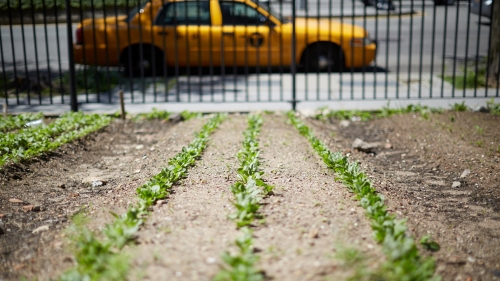
Nutrition and Food Studies
411 Lafayette Street, 5th Floor
New York, NY 10003
Phone: 212-998-5580
Email: nutrition@nyu.edu

